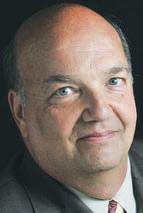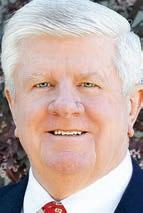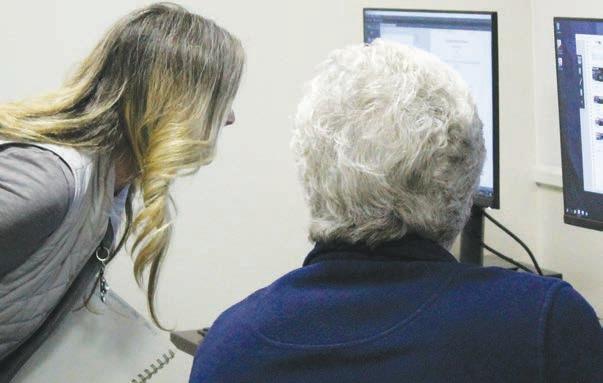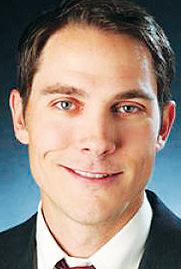In this issue
n Still concerned
Colorado business leaders are more upbeat, but also concerned about higher interest rates and inflation.
n Picture this
H.L. Sanders combines new technology with what he calls an old school approach in running his imaging business.

n Treasure hunt
A treasure hunt of sorts for artful goodies is planned for April 8 as a way to highlight Grand Valley arts and culture.
2 4 5
n Awarding effort
The chief executive officer of a Grand Junction-based real estate firm received an award for his community efforts.
n Rate edges up
The monthly jobless rate edged up in Mesa County, but still remains below the level at this time last year.
n Out with burnout
n As builders blame codes and fees for higher costs, city officials counter they’re needed to accommodate growth.

See page 2
New home construction continues in Grand Junction, but so do disagreements over how to address affordability issues.
n Departments
BUSINESS
News Business People THEBUSINESSTIMES.COM THE DEFINITIVE SOURCE FOR GRAND JUNCTION BUSINESS NEWS SINCE 1994 MARCH 30-APRIL 12, 2023 VOLUME 30, ISSUE 6
THE
TIMES
employees
and productive lives. Almanac 30 Business Briefs 28 Business People 30 Contributors 21-25 News 2-18 Opinion 26-27 Trends 19-20 PRSRT STD U.S. POSTAGE PAID PERMIT NO. 67 The Business Times 609 North Ave., Suite 5 Grand Junction, CO 81501 21 19
What’s love got to do with it? A lot when it comes to helping
lead happy
Business Times photo by Phil Castle
6
Building difference
Building difference
Builders, city officials disagree over effects of regulations and fees
Kelly Maves says she’s aggravated by what she sees as a contradiction: Calls for more affordable housing at a time when increasing regulations and fees on new home construction drive up prices.

“It’s beyond frustrating,” says Maves, who works as a real estate agent and whose husband, Michael, operates Maves Constrution in Grand Junction.
Business leaders more upbeat, but worried
Colorado index rises, but remains negative
Phil Castle The Business Times
Business People Almanac
Colorado business leaders are more upbeat heading into the second quarter, but remain concerned about higher interest rates and inflation.
Most of the leaders believe a recession will begin this year, an expectation that could be prompted in part by recent bank collapses.
Kelly Maves also serves on the board of directors of the Housing and Building Association of Western Colorado, an organization which supports the building industry and has pushed back against more regulations and higher fees.

But elected officials and administrators with the City of Grand Junction counter there’s a connection between fees and the cost of infrastructure required to accommodate growth, whether that’s streets, water and sewer system improvements or fire stations. The alternative is to fall behind what’s needed to keep pace with growth or make up funding shortfalls with other sources of revenue.
Putting off work on infrastructure tends to not only result in higher costs later on, but also raises safety issues, says Grand Junction Mayor Anna Stout. “It’s your future safety.”
See BUILDING page 14
New home construction continues to Grand Junction, although some builders blame regulations and fees for adding to prices. City officials say fees are necessary to help pay for infrastructure associated with growth
Mayor prefers local measures over statewide proposal

Anna Stout doubts what she considers a one-size fits all solution to promote more affordable housing across Colorado would fit in Grand Junction.

Efforts should instead be tailored to address the unique needs of the community, says Stout, who’s served four years on the Grand Junction City Council — currently as mayor. “It’s a local control issue.”
The Colorado Municipal League, an organization of 270 member cities and towns, also opposes the plan.
Colorado Gov. Jared Polis and a group of state legislators introduced what they said is a comprehensive plan to help create more housing.

“By cutting red tape, legalizing more housing choices, strengthening property owners’ rights and planning for future growth, we can create more housing at a lower cost in Colorado communities near where people work or play,” Polis stated in a news release.
According to the release, the plan includes a number of goals intended to create more housing, including:
n Legalize the ability to build more affordable housing types, including accessory dwelling units, duplexes, triplexes and townhomes.
n Incentivize more multifamily housing in or near transit-oriented and walkable communities.
n Cut red tape and reduce building limitations to decrease building time and offer homeowners more flexibility to build on their land.
n Assess statewide housing needs and identify strategies tailored to local and regional needs while providing a framework for state, regional and local agencies to align policies and investments.
n Construct more homes by eliminating arbitrary laws that prevent property owners from building the housing units communities need.
See PROPOSAL page 12
Rich Wobbekind
The Leeds Business Confidence Index rose 5.3 points for the second quarter. But at 45.1, the reading still reflects more negative than positive responses to the survey upon which the index is based.
The business research division of the Leeds School of Business at the University of Colorado at Boulder calculates the index.
Rich Wobbekind, senior economist and faculty director of the division, said the latest results constitute a move in a more encouraging direction, but remain negative nonetheless.
While the overall reading moved up from what was tied for the fourth-lowest reading in the 20-year history of the index, that reading has remained below the neutral level of 50 for the third longest period.
Individual scores for all six of the metrics the index tracks increased between the first and second quarters. But only one score — for sales — topped 50.
Wobbekind said the national and state economies continue to grow, although at what could be a slowing pace. Employment continues to grow as well, but at a slowing pace with layoffs in the tech sector.
The 230 Colorado business leaders who responded to the survey upon which the second quarter index was based mentioned higher interest rates and inflation as the reasons for their outlooks — 38 percent cited interest rates and 31 percent inflation.
Inflation in the Denver, Aurora and Lakewood metropolitan area is projected to increase 4.3 percent this year, down from the 4.5 percent increase projected last quarter, Wobbekind said.
While 42.3 percent of survey respondents said they expected a recession to begin in the second half of 2023, 15.3 percent expected a downturn in the first half of the year. See
THE BUSINESS TIMES News
Trends Contributors
Page 2 The Business Times March 30-aPril 12, 2023 STORIES AND PHOTO BY
PHIL CASTLE
INDEX
page 18
Kelly Maves
Anna Stout
Jared Polis

The Business Times 609 North Ave., Suite 5 Grand Junction, CO 81501 (970) 424-5133



www.thebusinesstimes.com

The Business Times is published twice monthly and distributed throughout Grand Junction, Fruita and Palisade. Advertising rates and deadlines are available upon request. Opinions expressed in this publication are those of the writers and don’t necessarily reflect the views of the publisher, editor or advertisers.
Copyright © 2023 — All rights reserved
H.L. Sanders combines what he describes as an old school approach with new technologies in A Different View, an imaging business he operates in Grand Junction. The firm offers architectural and culinary photography in addition to a variety of other services (Photo courtesy H.L. Sanders)

Picture this: Photographer brings varied experiences
to latest business venture
Phil Castle

The Business Times
Technological advances that have turned what are ostensibly telephones into cameras also have made photography less challenging.
But H.L. Sanders contends there’s more to creating quality images than pointing a smartphone and touching the screen.
“It’s not the camera,” Sanders said. It’s also the photographer, he said, not to mention composition, perspective, lighting and content.
Sanders combines in his Grand Junction business new technology with what he considers an old school approach
developed over a career that’s spanned more than 50 years. “Time brings experience. Experience brings wisdom,” he said.
Sanders operates A Different View, a firm that offers a variety of services, including architectural and culinary photography as well as images for advertising and marketing. The work helps real estate agents, construction businesses, restaurants and others, he said. “Good photography helps sell products.”

The venture is the latest for Sanders, who operated Precision Visual Communications and Progressive Air Imaging in Grand Junction. He previously worked as a photographer for the U.S. Department of Energy and served in the Army.
Sanders traces the origin of his career back to Grand Junction High School and a pilot program that taught students television studio operations.
See PICTURE page 16
For more information about A Different View, call (970) 260-1575, email hlsairphoto@q.com or visit https://adifferentviewllc.godaddysites.com.
Page 4 The Business Times March 30-aPril 12, 2023
H.L. Sanders
FOR YOUR INFORMATION
Artful treasure hunt planned to promote local arts and culture


Grand Valley Art Drop scheduled for April 8
Phil Castle Business Times

Lynnea Tai has for years staged a treasure hunt of sorts in which she hides the necklaces and bracelets she makes and offers clues on social media as to where people can find them.
Tai said the so-called art drops offer a way for her to give back, but also promote DarcMoon, her Grand Valley business that makes and sells malas and mala kits.
The effort will become even bigger this year with what’s billed as the Grand Valley Art Drop scheduled for April 8.
Tai said she’ll join with other artists and businesses in filling five bags with artistic creations and gift cards that will be hidden in Grand Junction, Fruita and Palisade. Each bag will contain more than $200 worth of items, she said. “That’s pretty awesome.”
On April 8, Tai will post clues about the locations of the bags on her Facebook and Instagram accounts. Participants will have to conduct a bit of research to figure out where to look, she said.
Tai expects hundreds of people to participate either in actively searching for the bags or following along to find out what happens. “It becomes something fun to do.”
A good time also serves a good way to promote the participating artists and businesses as well as the local arts and culture more generally, she said.
Tai makes malas, which can be worn as necklaces and bracelets, but also have long served a functional purpose in aiding in meditation and prayers. Tai said she often
Lynnea Tai, right, owner of DarcMoon, shows one of her malas to Liat Arochas, the owner of Wake the Voice. Tai and Arochas often work together to offer mala meditation and sound healing sessions. Tai is involved in the Grand Valley Art Drop, a sort of treasure hunt set for April 8 promoting local arts and culture. (Photo courtesy Tess Peterson) FOR YOUR INFORMATION

makes unique malas for specific customers using different beads and gemstones because of the properties they offer. Some stones calm, while others heal and protect. She also sells mala kits and stages workshops and other events.
Clues for the Grand Valley Art Drop will be posted April 8 on the DarcMoon page on Facebook and Instagram account @darcmoon_. For additional information about DarcMoon, visit the website at https://darc-moon.com.
March 30-april 12, 2023 The Business Times page 5
F
Professor keynote speaker at E Day luncheon
A college professor who teaches courses on business law and ethics is scheduled to deliver the keynote address at an upcoming event at Colorado Mesa University in Grand Junction.
Corey Ciocchetti, an associate professor at the University of Denver, will discuss leadership and integrity during his presentation at the annual Entrepreneurship Day luncheon set for noon May 2 at the University Center Meyer Ballroom.

Individual tickets for the luncheon event sell for $65. Table sponsorships are available for $650 and leadership sponsorships for $1,200. For tickets or additional information,

visit the website located at www.SupportingCMU.org/Eday.
Ciocchetti has won multiple teaching and speaking awards. The University of Denver Alumni Association named him outstanding professor of the year. He received the Joel Goldman Award for most respected speaker for CampusSpeak, which provides speakers and workshops to college campuses.
He’s the author of “Real Rabbits: Chasing an Authentic Life,” a book about the success that comes from contentment, personal relationships and character.
Ciocchetti holds a master’s degree in religious studies and bachelor’s degrees in finance and economics from the University of Denver as well as a law degree from the Duke University School of Law.
F
Council honors real estate executive
The chief executive officer of a Grand Junction-based real estate firm received a newly renamed award recognizing his contributions to the community.

Robert Bray received the Doug Sortor Lifetime Legacy Award from the Community Impact Council of Mesa County. The council presented the award at its annual Inspire Impact Breakfast at Colorado Mesa University.
The recognition was a surprise for Bray, who was asked to attend to present the award.
“This means a lot to me, and I hope that you will carry this legacy of Doug forward in the good work that you all do,” Bray said to those at the event.
The award recognizes the achievements of leaders who’ve demonstrated a lifetime of dedication to community service and philanthropy.
Bray serves as CEO of Bray & Co., a family real estate business his grandparents, Sherman and Roxie Bray, started in 1946 in the remodeled front porch of their downtown Grand Junction home.
Bray & Co. established the Bray Cares Foundation and partners with the Western Colorado Community Foundation to raise funds and make grants to nonprofit organizations. Since its inception in 2019, the foundation has awarded a total of $110,000 in grants.
The Community Impact Council provides a collective voice and forum for non-profit organizations in Mesa County.
The council renamed its Community Impact Award in memory of Sortor, a champion of the nonprofit community.
Sortor graduated from what’s now Colorado Mesa University. He worked as an executive with United Parcel Service and then Strive, a Grand Junction-based organization that provides services to children and adult with intellectual and developmental challenges. Sortor died in 2022. F
Page 6 The Business Times March 30-aPril 12, 2023
Corey Ciocchetti
Subscribe today to the journal that means business in the Grand Valley. (970) 424-5133 www.thebusinesstimes.com
Robert Bray

Selestina Sandoval, left, deputy city clerk for the City of Grand Junction, and Laura Bauer, an election judge, test the logic and accuracy of tabulation machines in preparation for the municipal election. Voters must return ballots by 7 p.m. April 4. Voters can mail their ballots, drop them in one of the secure ballot boxes in Grand Junction or bring them to the city clerk’s office on the first floor of Grand Junction City Hall at 250 N. Fifth St. The city clerk’s office will be open from 7 a.m. to 7 p.m. on election day April 4 for voters to bring in ballots. Ballot box locations and other information is available on the city website located at www.gjcity.org. (Photo courtesy Jocelyn Stafford, City of Grand Junction)

Educator selected to receive AAUW honor

A former middle school science teacher who’s become an educator’s educator will be honored for her accomplishments and contributions to the Grand Valley community.
Heidi Ragsdale will receive the Women Who Make History Award from the Grand Junction branch of the American Association of University Women. The award will be presented at a luncheon set to begin at 11:30 a.m. April 15 at the DoubleTree by Hilton Hotel, located at 743 Horizon Drive.
The event is open to the public. Tickets sell for $35, a portion of which goes to support women veterans scholarships. Advance registration and payment is required by April 10. To purchase tickets, call Lalee at (970) 523-5510 or log on to http://grandjunction-co.aauw.net.

Ragsdale runs STEM is My Future in Grand Junction, providing professional development for teachers on geographic information systems and problem-based learning. She provides virtual training through the Grand Junction MakerSpace at the Business Incubator Center.
She’s a certified geospatial educator, National Geographic certified educator and mentor and teacher advisory council member with National Geographic.
She’s also a space exploration educator crew Orion member with Space Center Houston and Space Foundation teacher liaison.
She also serves as webmaster for Colorado Delta Kappa Gamma, which promotes the professional growth of women educators, and a board member of the Latin Anglo Alliance Foundation. She belongs to GJSpaceLadies, a group of space-loving educators.
In 2022, Girl Scouts of Colorado named Ragsdale one of three Western Slope Women of Distinction.
“I am astounded at the accomplishments in STEM, education and space exploration that Heidi has made in not that many years,” said Jane Fitzgerald, president of the Grand Junction Branch of the AAUW. “She is someone whose name will long be remembered for her contributions not only to this community, but to the advancement of women and girls in science. AAUW is very pleased to make this award to Heidi.”
A national organization founded in 1881, the AAUW advances equality for women and girls through research, education and advocacy. The group is open to anyone with an associates, bachelors or higher degree from a regionally accredited college or university.
Page 8 The Business Times March 30-aPril 12, 2023
F
Heidi Ragsdale

March 30-april 12, 2023 The Business Times page 9
Nominations sought for E-Day award
Nominations will be accepted through April 10 for an annual award presented as part of Entrepreneurship Day at Colorado Mesa University.
The Excellence in Entrepreneurship Award honors entrepreneurs who’ve contributed to the economic development of the region.
To be eligible for the award, nominees must have started a business or taken it to a significant new level, experienced at least three years of successful operations and contributed to the economic development of the region. Nominees also should exemplify entrepreneurial values.
Nomination letters should address the award criteria and be mailed to the Excellence in Entrepreneurship Committee,
Department of Business Administration, attention Carlos Baldo, Colorado Mesa University, 1100 North Ave., Grand Junction, CO 81501.
The annual Entrepreneurship Day luncheon is set for noon May 2 at the University Center Meyer Ballroom.
Corey Ciocchetti, an associate professor at the University of Denver, will discuss leadership and integrity during what’s scheduled as his keynote presentation.
Individual tickets for the luncheon event sell for $65. Table sponsorships are available for $650 and leadership sponsorships for $1,200. For tickets or additional information, visit the website located at www.SupportingCMU.org/Eday.
Summit keynote speaker announced
The head of the state economic development agency is scheduled to deliver the keynote address at an upcoming economic summit in Grand Junction.
Eve Lieberman, the executive director of the Colorado Office of Economic Development and International Trade (OEDIT), is scheduled to speak at the Western Colorado Economic Summit scheduled for April 27 at Colorado Mesa University.


“We are thrilled to have Eve Lieberman as this year’s keynote speaker and look forward to her insight regarding the future of Western Colorado’s economy,” said Curtis Englehart, executive director of the Grand Junction Economic Partnership, which stages the annual summit.
“The spirit of the Western Slope is evident in its increasingly diversified economy,” Lieberman said. “From sectors like energy and natural resources to agriculture and outdoor recreation to advanced manufacturing, technology and health care, the culture and the economy are deeply tied to the region’s geography and strong work ethic. I look forward to discussing current economic trends and the ways that OEDIT and the state can support continued economic development in this important part of Colorado.”
Lieberman started her latest position at the beginning of the year.
She previously served as chief policy advisor and legislative counsel to Colorado Gov. Jared Polis. She worked on efforts to help small businesses, lower the cost of health care and implement fullday kindergarten and universal preschool. She also worked 10 years in Congress, including a stint as chief of staff for Polis when he served as a U.S. representative.
Lieberman holds a political science degree from the University of Michigan and law degree from George Washington University Law School.
During her keynote address, Lieberman will discuss the economic landscape, how trends are shifting OEDIT’s role in advancing economic growth across the state and how Western Colorado businesses can benefit from OEDIT programs.
The Western Colorado Economic Summit also will include breakout sessions on housing, transportation and work force development.
Tickets to the summit are limited. For more information about availability, send an email to info@gjep.org. For more information about the summit, including the full agenda, visit the website located at www.WestCoEconomicSummit.org.
Page 10 The Business Times March 30-aPril 12, 2023
F
Eve Lieberman
F




usiness Times page 11
Proposal
Continued from page 2
A variety of officials and leaders from across Colorado hailed the plan, including Loren Furman, the president and chief executive officer of the Colorado Chamber of Commerce.

“When it comes to talent recruitment and work force development, Colorado’s limited housing supply and affordability is a growing concern for businesses statewide,” Furman says. “We are in desperate need of new tools and incentives to increase the development of new housing, especially in high-demand areas where employers are looking to attract a diverse collective of workers. We applaud Gov. Polis for his leadership to streamline development and deploy new tools to ensure our communities can support long-term growth in Colorado’s work force and economy.”

But Kevin Bommer, executive director of the Colorado Municipal League, says the plan represents the most sweeping attempt in recent history to usurp local control and home rule authority.
“It is a breathtaking power grab,” Bommer says. “Although the bill is being sold as a menu of options with flexibility to create affordability, it mainly benefits developer interests to the detriment to the quality of life and access to local elected officials expected by Coloradans and with no guarantees that anything built will be affordable.”
Stout said measures that might work in the Denver metropolitan area or mountain resort towns won’t necessarily work in Grand Junction.
The city has a role to play in promoting the availability of more affordable housing and is working to address the issue in a number of ways, she says.

The city and its partners worked with a Colorado consulting firm to develop a housing needs assessment and subsequently city housing strategies, she says. Those strategies include land use code changes that promote accessory dwelling units and a variety of other housing types, incentives for projects that supply affordable housing units and collaboration with local organizations that address issues related to housing and homelessness.
Grand Junction City Manager Greg Caton says the city has allocated nearly $7 million for various efforts related to housing, including funding for Housing Resources of Western Colorado and Catholic Outreach as well as funding for land acquisition and special projects.
The city contributed $750,000 and received a $2.25 million Innovative Housing Incentive Grant from the Colorado Department of Local Affairs to acquire a 15-acre property to construct affordable and work force housing along the 24 Road corridor.
Stout says the city and its partners are better suited to address unique housing issues than a comprehensive statewide plan. “We know Grand Junction better than anyone does.”
Page 12 The Business Times March 30-aPril 12, 2023
F
Our Business is Supporting Small Business
The West was founded on the pioneering spirit of those who dared to seek a better and more prosperous life for themselves and their families. Today, that same confidence echoes through our small business community and forms the backbone of the diversified and thriving economy of Colorado. The Grand Junction Small Business Development Center champions this mission by supporting entrepreneurs wishing and willing to pursue their unique versions of their American dreams.
The Grand Junction Small Business Development Center, one of seven programs at the Business Incubator Center and one of 14 Small Business Development Centers across the state, is committed to supporting small businesses by providing low- to no-cost classes and free, unlimited and confidential one-on-one consultancy to entrepreneurs at all stages of their business trajectories.
Our business consultancy is administered by a team of small business certified consultants who draw on a wide range of specialties, skills and knowledge acquired mostly through successful careers as business founders and executives. Engaging these individuals can provide clarity in addressing specific questions an owner might face, but also can help entrepreneurs strategically in seeing the big picture that too often becomes clouded by day-to-day management. Using this support can weigh heavily on the success and failure of a venture.
Based on first quarter results, our center is on pace to consult with more than 500 individual businesses and entrepreneurs in 2023. This more than 40 percent increase over our service reach in 2022 puts the Grand Junction Small Business Development Center on par with engagement metrics from much larger, more densely populated service centers along the Front Range and in the Denver metropolitan area.
To supplement our consultancy, we provide educational opportunities aimed at building overall business capacity and acumen. Our revolving schedule of low- to no-cost classes and trainings include such general classes as bookkeeping bootcamp and how to start a business in Western Colorado to such nuanced specialty trainings as HR implications of legislative changes for small business. In addition to one-off classes, we offer the cohort-based, multi-week, LeadingEdge strategic planning series that has led to the establishment of several Main Street businesses in the Grand Valley. Our wide range of educational offerings allows us to engage entrepreneurs at multiple stages of the business lifecycle and across a multitude of topic areas.

Whether you’re curious about taking one of our business classes, brainstorming an idea for a new concept, seeking ways to increase growth and sales of an established business or looking to sell or exit a well-established business that has been in your family for generations, the Grand Junction Small Business Development Center and Business Incubator Center have resources and consultants that can help navigate the path so you don’t have to go it alone.
For more information about how the Grand Junction Small Business Development Center can support your business needs, call (970) 243-5242 or visit our office at 2591 Legacy Way.


Jeff Engell, director of the Grand Junction Small Business Development Center, brings to the role more than a decade of organizational leadership and consulting experience in fostering the mission of economic growth and development.
Since its founding in 1987, the Business Incubator Center has been a key pillar of economic development in Mesa County and the surrounding region. The oldest business incubator in Colorado, the center hosts seven programs: the Grand Junction Small Business Development Center (SBDC), Business Loan Fund of Mesa County, Mesa County Enterprise Zone, two world-class incubator programs, Fworks and Grand Junction MakerSpace. The Business Incubator Center is an invaluable resource for small businesses in the region.

March 30-april 12, 2023 The Business Times page 13
Applications sought for work-based learning program
The Colorado Department of Labor and Employment is accepting applications for its work-based learning inventive program.
The program provides incentives for employers interested in growing and diversifying the experiential learning system to create new or enhance existing work-based learning programs for youth and adults.
The program offers Colorado-based employers reimbursements of up to $10,000. Small businesses and those in rural communities are eligible to receive additional incentives of $100. Both private and nonprofit employers are eligible to apply. Applications will be evaluated in the order they are received with funding available on a first-come, first-served basis. The program will run through May 2024 or until funding runs out.

“Finding and keeping talented employees can be challenging in today’s job market. One proven strategy used by businesses of all sizes in all industries all across Colorado is work-based learning,” said Stephanie Mufic, business innovation and strategy unit manager at the state labor department. “This program will provide funding to help with the startup costs of developing work-based learning programs, including training dollars that could be used in partnership with institutions of higher education or other training providers.”
For additional information about the program — including a checklist to prepare employers for the application process and instructions on how to apply — applicants should visit the website located at wbli.cdle.co.
Building
Continued from page 2
Maves says city regulations and increased impact fees have made housing less affordable, not builders.
Depending on the size of the house, fees add $10,000 to $20,000 or more to the cost of a home. That’s an addition builders must pass on to homebuyers, Maves says.
According to report from the National Association of Home Builders, every $1,000 increase in the cost of a home in Grand Junction, prices 81 homebuyers out of the market.
Charlie Gechter, the owner of BOA Builders, and Ron Abeloe, president of Chaparral West, say existing codes add to the cost of new homes and housing developments. Proposed codes will add still more costs.
Gechter and Abeloe say a section of the city code requires a survey of existing trees on a proposed development as well as the protection of trees and replacement of trees that must be removed. Yet the code doesn’t account for trees replaced through homeowner association landscaping requirements.
Abeloe says the tree canopy has increased over the years in the Grand Valley, but mostly as a result of development. Moreover, some species of trees — cottonwoods in particular — consume large quantities of water in an area where water is usually scarce.
Proposed code changes that include electric vehicle charging stations, multimodal pathways and underground utility requirements would add additional costs.
Grand Junction City Manager Greg Caton says fees on new construction pay for infrastructure needed to accommodate growth. Studies help determine the connections between growth and associated costs.
The fees help pay for new and improved roads, more fire stations and expanded water and sewer treatment facilities, Caton says. The fees can’t be used to maintain existing infrastructure or ongoing operations.
Like builders, the city also faces increased costs for materials, including asphalt and water lines. But development fees don’t make up for all the increased costs, he says.
Stout says increases in transportation and park fees were phased in over four years, but still don’t cover all of the costs.
Maves says regulations and higher fees add to the cost of housing and make housing less — not more — affordable. “It’s a problem you’re not going to solve through regulation.”
Gechter says finding ways to build and sell more houses would provide increased supply to moderate prices.
Abeloe says there are ways the city and private sector can work together to address the housing affordability issue.
But for now, he says he’s frustrated by calls for more affordable housing while more regulations and higher fees are imposed. “It’s a contradiction.”
Page 14 The Business Times March 30-aPril 12, 2023
F
F



March 30-april 12, 2023 The Business Times page 15
Continued from page 4
After graduating from high school, Sanders enlisted in the Army and completed a nine-month instructional program in photography, motion pictures and video production. He served as reconnaissance photographer in the Vietnam War.
Sanders subsequently worked as a photographer for the U.S. Department of Energy office in Grand Junction. He said he was involved in a variety of work, including scientific and advertising projects as well as presentations shown worldwide.
He said he was offered an opportunity to lead a five-year photographic project in Saudi Arabia, but decided instead to start his own business.
Precision Visual Communications handled a variety of architectural, culinary, fashion and scientific work for a range of clients, he said. He started offering aerial photography through Progressive Air Imaging, including closeup photos of aircraft owners and their aircraft over scenic landscapes.
Over the years, Sanders endured a series of setbacks that included a fire that destroyed his studio and the theft and destruction of Cessna 206 he purchased for
views and advice
Progressive Air Imaging. He said he closed his businesses in a downturn that began after the terrorist attacks in 2001.
He said he’s eager with A Different View to go back to work for himself as well as continue to enjoy his passion for creating images.
While he initially was skeptical digital imaging would ever equal film for quality and resolution, he said he’s since changed his mind. “I am a digital advocate.”

Technology has advanced, in fact, to a state that surpasses human eyesight.
An understanding of physics, chemistry and the operations of film cameras are no longer required. Technology also enables photographers to focus less on mechanics and more on their subjects and artistic expression, Sanders said.
But it’s not just the camera, he said. Other skills remain important in creating quality images, including those involved with composition, perspective, lighting and content.
That makes the combination of new technology with an old school approach something a best-of-both-worlds difference he can offer clients. F


Registration now under way for SBA summit
Registration is under way for the 2023 National Small Business Week virtual summit.
The U.S. Small Business Administration and SCORE has scheduled the online summit for May 2 and 3. The summit will feature educational workshops, access to federal resources and networking.
National Small Business Week is set for April 30 to May 6 with events in Washington, D.C., and four other cities.
The virtual summit is free, but registration is required. For more information about National Small Business Week and the summit, visit www.sba.gov/NSBW.
“Providing support to small businesses through education, networking and mentorship is what SBA and SCORE do best,” said Christina Hale, SBA associate administrator for communications and public liaison. “This annual event has become a cornerstone of National Small Business Week, attended by thousands of entrepreneurs across the country.”
Bridget Weston, chief executive officer of SCORE, said the network of volunteer business mentors is eager to partner with the SBA to present the summit.
“This summit offers incredibly valuable information, tools and resources to American small business owners at no cost and in an accessible virtual environment,” Weston said. “We look forward to connecting with thousands of entrepreneurs and supporting them on their journeys to success.”
Page 16 The Business Times March 30-aPril 12, 2023 News,
you can use Subscribe today to the journal that means business in the Grand Valley. (970) 424-5133 www.thebusinesstimes.com
Picture
F
H.L. Sanders offers a range of services to clients, including culinary photography that can help restaurants sell their fare. Sanders brings to his latest venture more than 50 years of experience with stints in the Army and for the U.S. Department of Energy as well as operating his own businesses. (Photo courtesy H.L. Sanders)



March 30-april 12, 2023 The Business Times page 17
Index
Continued from page 2
Another 18.6 percent of survey respondents anticipated a recession in or after 2024.

The collapse of California-based Silicon Valley Bank and New York’s Signature Bank could have exerted effects on the national economic outlook, Wobbekind said.
Colorado continues to rank among the top states for personal income and the production of goods and services, he said. BrianLewandowski, executive director of the business research division of the Leeds School of Business, said labor estimates for Colorado were less heartening.

As of February, the latest month for which numbers are available, nonfarm payrolls increased 46,700 over the past year, a 1.6 percent gain. That lags behind a 2.9 percent gain nationwide over the span span.
Employment continues to grow in Colorado, but more slowly, Lewandowski said. “I think that’s a little troubling.”

The labor participation rate remains high, however, at 68.3 percent in February, he said.
For the Leeds Business Confidence Index, the individual score was lowest at 37.1 for expectations for the national economy despite a 2.7 point increase from the first quarter. While 10.9 percent of survey respondents predicted moderate or strong increases, 57.8 percent forecast moderate or strong decreases and 31.3 percent no change.
Expectations for the Colorado economy rose 4.6 points to 46.4 with 18.7 percent of respondents predicting increases and 32.1 percent decreases. At 49.1 percent, most anticipated no change.
The score was highest for expectations for sales with a 9.5-point increase to 50.4. For the second quarter, 34.8 percent of respondents predicted increases, while 33.1 percent anticipated decreases and 32.2 percent no change.
Expectations for profits rose 7.9 points to 47.6 with 27 percent predicting increases, 34.7 percent decreases and 38.3 percent no change.
Expectations for capital expenditures rose 2.7 points to 42.4 with 17.8 percent anticipating increases, 41.7 percent decreases and 40.4 percent no change.
Expectations for hiring increased 4.6 points to 46.7 with 26 percent predicting staffing increases, 34.8 percent layoffs and 39.1 percent no change. F

Page 18 The Business Times March 30-aPril 12, 2023
FOR YOUR INFORMATION
full results of the
Confidence Index
the second quarter are available online at the website located at www.colorado.edu/business/ business-research-division.
B. Lewandowski
The
Leeds Business
for
INDICATORS AT A GLANCE
n Business filings
s New business filings in Colorado, 48,806 in the fourth quarter, up 37.2 percent from the fourth quarter of 2021.
n Confidence
s Consumer Confidence Index 104.2 for March, up 0.8.
s Leeds Business Confidence Index for Colorado, 45.1 for the second quarter, up 5.3.
s National Federation of Independent Business Small Business Optimism Index 90.9 for January, up 0.6.
n Foreclosures
s Foreclosure filings in Mesa County, 26 in February, up from 20 in February 2022.
s Foreclosure sales in Mesa County, 3 in February, up from 1 in February 2022.
n Indexes
s Conference Board Employment Trends Index, 118.29 for February, up 0.15.
t Conference Board Leading Economic Index 110 for February, down 0.3%.
s Institute for Supply Management Purchasing Managers Index for manufacturing, 47.7% for February, up 0.3%.
n Lodging
s Lodging tax collections in Grand Junction, $254,659 for December, up 16% from December 2021.
n Real estate
t Real estate transactions in Mesa County, 212 in February, down 36.9% from February 2022.
t Dollar volume of real estate transactions in Mesa County, $83 million in February, down 40.7% from February 2022.
n Sales
s Sales and use tax collections in Grand Junction, $6 million for December, up 7.4% from December 2021.
s Sales and use tax collections in Mesa County, $3.7 million for February, up 3.1% from February 2022.
n Unemployment
s Mesa County — 3.8% for February, up 0.1.
s Colorado — 2.9% for February, up 0.1.
s United States — 3.6% for February, up 0.2.
Jobless rate edges upward
But unemployment in Mesa County remains lower than a year ago
Phil Castle Business Times

The monthly unemployment rate has edged up in Mesa County, but remains below the level of a year ago.
The jobless rate is expected to retreat with seasonal hiring in the spring, and the labor force continues to grow.
AREA JOBLESS RATES
News Trends Contributors Opinion Business Briefs Business People Almanac
“Overall, I think we’re looking not too bad,” said Celina Kirnberger, employer services supervisor at the Mesa County Workforce Center in Grand Junction.

The seasonally unadjusted unemployment rate rose a tenth of a point to 3.8 percent in February, according to the latest estimates from the Colorado Department of Labor and Employment. At this time last year, the rate stood a 4.6 percent.
Kirnberger said it isn’t unusual for jobless rates to rise in February as winter weather affects hiring in jobs involving outdoor work. She said she’s encouraged, though, the rate remains lower than last year even as the labor force has grown. “That’s a very good sign.”
Between January and February, Mesa County payrolls increased 183 to 74,718. But the number of people counted among those unsuccessfully looking for work also increased — 146 to 2,980. The labor force, which includes the employed and unemployed, grew 329 to 77,698.
Over the past year, payrolls increased 1,461 — nearly 2 percent. The ranks of the unemployed decreased 542. The labor force grew 919.
Job orders posted at the Mesa County Workforce Center — a measure of labor demand — continue to decline on a year-over-year basis, Kirnberger said.
For February, 630 job orders were posted. That’s down from 740 for the same month last year. For the first two months of 2023,
1,305 orders were posed. That’s down from 1,757 for the same span in 2022. The number of job openings associated with job orders also declined — 1,582 in February 2023 compared to 1,963 in February 2022. While labor shortages persist for some industry sectors, Kirnberger said she’s seeing more balance between job openings and job seekers. “It feels like it’s much more even now.”
More will be known when the March labor estimates are published. They’re scheduled for release April 21.
Kirnberger said she expects the monthly unemployment rate to edge back down moving into spring and summer. There’s some uncertainty among employers, however, about the potential for recession and decreased sales.
Seasonally unadjusted unemployment rates also edged up in neighboring Western Colorado counties in February — a tenth of a point to 3.6 percent in Rio Blanco County and 3.7 percent in Montrose County, two-tenths of a point to 3.2 percent in Garfield County and three-tenths of a point to 4.5 percent in Delta County. The statewide seasonally adjusted jobless rate rose a tenth of a point to 2.9 percent, but remained below 3 percent for a 10th consecutive month.
Nonfarm payrolls grew 6,200 between January and February with a gain of 4,400 in the private sector and 1,800 in government. What initially was estimated as increase of 800 jobs in January was revised downward to a loss of 700.
The labor force participation rate rose two-tenths of a point to 68.3 percent.
Over the past year, nonfarm payrolls increased 46,700 with the biggest gains in the leisure and hospitality, professional and business services and educational and health services sectors. Over the last year, the average workweek for Colorado employees on private, nonfarm payrolls shortened two-tenths of an hour to 32.7 hours. Average hourly earnings increased $1.91 to $35.68.
Index: U.S. consumers slightly more confident
A measure of consumer confidence has edged up on more upbeat expectations for business and labor conditions, but still reflects concerns over inflation and the possibility of recession.
The Conference Board reported its Consumer Confidence Index rose eight-tenths of a point to 104.2 in March. A component of the index tracking the short-term outlook increased, but a component tracking assessments of current conditions decreased.
“While consumers feel a bit more confident about what’s ahead, they are still slightly less optimistic about the current landscape,” said Ataman Ozyildirim, senior director of economics at the Conference Board, a member- driven think tank based in New York.
Ozyildirim said the gain reflects an improving outlook among consumers under 55 years old and for households earning $50,000 and more. Consumers expect inflation to remain elevated over the next year, though.
Asked about their spending plans for services over the next six months, consumers said they expect to decrease discretionary spending on amusement parks, dining and movies. They expect to increase spending on auto and home maintenance and health care, however. Spending on personal and pet care as well as such financial services as tax preparation will remain about the same.
The present situation component of the index fell 1.9 points to 151.1.
The proportion of consumers who responded to the survey upon which the March index was based who described as “good” rose four-tenths of a point to 18.4 percent. The share of those who called conditions “bad” rose more — 1.9 points to 19.3 percent.
The proportion of consumers who said jobs were “plentiful” fell 2.1 points to 49.1 percent. The share of those who said jobs were “hard to get” held steady at 10.3 percent.
The expectations component of the index rose 2.6 points to 73. The component has remained below 80 for 12 out of the last 13 months. A reading below 80 often signals a recession within the next year.
The share of consumers who said they expect business conditions to improve over the next six months rose nine-tenths of a point to 15.5 perent. The proportion of those who said they anticipated worsening conditions fell 3.1 points to 18.5 percent.
The share of consumers who said they expect more jobs to become available in coming months rose a half point to 15 percent. The proportion of those anticipating fewer jobs fell 1.3 points to 19.9 percent.
While 14.9 percent of consumers said they expect their incomes to increase, up a half point from February, 13.6 percent anticipated decreases. That’s up two points from February.
F March 30-april 12, 2023 The Business Times page 19
F
Feb. Jan. s Delta County 4.5 4.2 s Garfield County 3.2 3.0 s Mesa County 3.8 3.7 s Montrose County 3.7 3.6 s Rio Blanco County 3.6 3.5
Celine Kirnberger
Ataman Ozyildirim
Decline in leading index signals risk of recession

A monthly index forecasting economic conditions in the United States declined for an 11th straight month, signaling the risk of recession.
The Conference Board reported its Leading Economic Index fell three-tenths of a percent to 110 in February. Separate measures of current and past conditions increased.
While the leading index declined at a slower pace in February than in recent months, the latest information continues to point to risk of recession, said Justyna Zabinska-La Monica, senior manager for business cycle indicators at the Conference Board.
“The most recent financial turmoil in the U.S. banking sector is not reflected in the LEI data, but could have a negative impact on the outlook if it persists,” she said. “Overall, the Conference Board forecasts rising interest rates paired with declining consumer spending will most likely
push the U.S. economy into recession in the near term.”

The Leading Economic Index declined 3.6 percent over the past six months, more than the 3 percent drop in the six months before that.
Gross domestic product, the broad measure of goods and services produced in the country, grew at an annual rate of 2.7 percent in the fourth quarter and 3.2 percent in the third quarter.
For February, six of 10 components of the leading index retreated, including average weekly manufacturing hours, consumer expectations for business conditions, interest rate spread and leading credit and new orders indexes. An increase in average weekly initial claims for unemployment benefits also pulled down the index. Four components advanced — building permits, new orders for both capital and consumer goods and stock prices.


The Coincident Economic Index edged up a tenth of a percent to 109.8. The index increased six-tenths of a percent over the past six months.
For February, three of four components advanced — nonfarm payrolls, personal income and sales. Industrial production retreated.
The Lagging Economic Index rose two-tenths of a percent to 118.5. The index increased seven-tenths of a percent over the past three months.
For February, four of seven components advanced, including the average prime rate charged by banks, consumer credit and inventories. A decrease in the average duration of unemployment bolstered the index. Three components retreated — commercial and industrial financing and changes in the cost of labor and services.
Page 20 The Business Times March 30-aPril 12, 2023
F
COMING ATTRACTIONS
n The next session of a business startup workshop is set for 2 to 4 p.m. April 6 at the Business Incubator Center at 2591 Legacy Way in Grand Junction.
The workshop will cover the business planning process, including financing options, legal structures, licensing requirements and trade name searches. Admission is $55, half off for the second participant from the same business.
For more information about upcoming events, programs and services at the Business Incubator Center, call 243-5242 or log on to https://gjincubator.org.
n The Fruita Area Chamber of Commerce has scheduled its annual banquet for 5 to 10 p.m. April 15 at the Fruita Community Center, 324 N. Coulson St.
The event will include a cocktail hour, appetizers, dinner, an awards ceremony and live entertainment. Admission is $75 for individuals, $700 for a table for eight.
For additional information or reservations, call 858-3894 or visit the website located at https://fruitchamber.org.
n The Western Colorado Human Resource Association has scheduled its next monthly membership luncheon for 11:30 a.m. to 1 p.m. April 19 at the Mesa County Workforce Center, 512 29 1/2 Road in Grand Junction. The event will include a presentation on changes to retirement planning.
WCHRA members may attend at no additional charge. Others pay $20. To register or obtain more information, visit www.wchra.org.

Extinquishing burnout
What’s love got to do with it? A lot, according to employee surveys
A physician I know I’ll call Dr. Good was once passionate about his work and caring for his patients. He exuded compassion, joy and optimism even though he often faced tragic circumstances.
I recently reconnected with Dr. Good. The change in his outlook and demeanor was startling. He was morose, cold and seemingly uncaring. I asked how things were going. He sighed and said a new medical group owned his practice and all they seemed interested in was paperwork and processes. What he loved most about his work — caring for patients, solving the riddles of what ailed them and knowing he made a difference in their lives was secondary. He was considering quitting and possibly leaving medicine altogether.

Dr. Good isn’t alone. Record numbers of people have quit their jobs recently. Many cited the COVID-19 pandemic and burnout as the reasons for what’s dubbed the “great resignation.” Some believe that unless work changes, retaining talent isn’t going to get any easier. What, exactly, is burnout? Does burnout explain the changes to Dr. Good?
The three components of burnout are emotional exhaustion, depersonalization — or cynicism — and reduced personal accomplishment. Someone must score low in all three areas to be considered burned out. Burnout isn’t synonymous with depression or being stressed out.
I work at Triad, an employee assistance program that provides confidential conflict resolution, counseling, crisis support and training for organizations and their employees. Triad has received numerous requests from well-intentioned organizations, particularly those in health care and education, to provide training on burnout. Sometimes the request feels like a “fix” for workers who are burned out — to help staff with resiliency and stress and time management skills to endure the sometimes grinding nature of their jobs.
A more meaningful and long-lasting approach to burnout often has nothing to do with workers. Instead, burnout signals an organization should redesign the work environment and jobs to help employees find greater meaning in their work and lead happier and more productive lives.
ADP Research Institute recently surveyed more than 50,000 workers to determine what improves engagement, inclusion, performance and retention. Of all the predictors, three questions were most powerful:
Was I excited to work every day last week?
Did I have a chance to use my strengths every day?
Do I get to do what I’m good at and something I love?
Opinion Business Briefs Business People Almanac
The results led Marcus Buckingham, head of people and performance research at ADPRI, to write a Harvard Business Review article — https://hbr.org/2022/05/designing-work-thatpeople-love — about how organizations must redesign work with love at its core. What does that mean? Is it possible to rekindle the passion of someone like Dr. Good?
Here are three core principles to incorporate into everything a business does:
n People are the point. Employees, rather than customers or shareholders, are the most important stakeholders. This starts with recruiting individuals and matching their specific strengths and loves to their jobs. Dr. Good was an excellent recruit. To salvage his potential, determine his professional and personal goals, provide ongoing educational opportunities and encourage him to grow and develop.
n One size fits one. Each employee is unique with distinct interests, loves and skills. Dr. Good loves patient care. Strive to minimize unnecessary barriers to patient care. Another doctor might enjoy processes and systems that increase efficiency. Create teams that celebrate idiosyncrasies and understand individual loves and loathings that contribute to patient outcomes versus cookie cutter approaches.
n In trust we grow. For employees to discover and contribute their loves at work, leaders must explicitly make trust of coworkers, their boss and senior leaders a priority. Trust workers to exercise their autonomy and give them freedom to do their jobs the way they want.
Data from the Mayo Clinic in its research into burnout in doctors and nurses suggests that 20 percent of the work you love to do is the threshold. If it’s less than 20 percent, you’re far more likely to experience physical and psychological burnout. Curiously, more than 20 percent doesn’t seem to net much increase in resilience. A little love of what you do at work can make a big difference.
John Gribben is a consultant for Triad, an employee assistance program serving employers in Colorado and surrounding states. Triad provides support for employers and employees confronting a variety of unresolved personal and work-related problems. Gribben also belongs to the Western Colorado Human Resource Association. Reach Gribben at 242-9536, john@triadeap.com or by visiting the website at www.triadeap.com. For more information about the WCHRA, log on to www.wchra.org. F
March 30-april 12, 2023 The Business Times page 21 Trends Contributors
John Gribben
Empower your team for greater freedom and success
Business owners typically dream of freedom, wealth and happiness as they exert greater control over their destinies. They start ventures to achieve financial, professional and personal independence, then use that independence to give back, travel, relax and enjoy their lives to the fullest extent.
These dreams never come true for many business owners, though, because they lack the mindset, processes and people to make them a reality. A number of key factors are required to enable a business to run effectively without the constant presence of the owner. Understanding these factors and making the necessary adjustments will position you to realize your dreams.
n The owner micromanages and fears giving up control. If you believe no one else will run your business the way you do, you’re correct. You’re unique, and so is your perspective of your business. Still, there are others who could do an excellent, if not better, job than you. Relinquishing control appropriately can be learned and is made easier once competent team members, trust and effective delegation are in place.
n The owner hasn’t mastered the art of delegation or realized the value of empowering team members. Learning to delegate tasks and projects to team members liberates you and empowers them. There are crucial components to effective delegation at which one must become proficient to do so effectively. Every business owner I coach is amazed at the freedom they gain, the ownership their team members take on and how much smoother the business runs once effective delegation is implemented.
n Managers aren’t competent enough to run the
business. Another benefit of delegation is it enables business owners to discover who’s capable of taking on a job and who isn’t. If you already have a manager or managers in place and, through planned and effective delegation and careful observation on your part, discover they’re not capable of running the day-to-day operations effectively, you have two choices. You can develop them or replace them.

n The owner is the only team member who can handle all aspects of the business. If you’ve created a situation in which you’re the only one who can effectively run your business, you’re tied by necessity to its daily operations. Your success here lies in hiring caring and competent individuals and providing them with ongoing professional development so they can excel and become leaders in their own right.

n The business lacks structure, processes and a system of practical procedures. It’s imperative to put in place a system of simple and effective processes and operational procedures to effectively deal with the situations that will inevitably arise. The success of your company depends on it. Business owners are often surprised and always delighted to discover how easy these are to create as well as how appreciated and liberating they are to everyone involved.
n The owner hasn’t built a team that can effectively run the business in the owner’s absence. The fear of
relinquishing control over day-to-day operations can be overcome by building a team that can actually run the business — and run it well — without the owner’s constant presence. When the success of your business depends solely upon you, you trap yourself into a job. When you build a competent team and the responsibility for the success of the business is spread out through a team approach, everyone benefits, including the owner.
Countless businesses thrive under the day-to-day leadership of their managers and team members, with the owner providing general oversight, direction and new ideas. As you release your fears and build an empowered team that can handle daily operations, this can be your reality, too.
There’s much to consider in developing successful hands-off leadership. But with qualified business coaching and training, the thriving business of your dreams is within your reach. Adopt a more powerful mindset. Put in place necessary structures, processes and systems. Hire potential leaders — and let go of those who aren’t — and offer leaders ongoing assistance in developing their potential. Your dreams of greater freedom, happiness and success will come true.
Marcus Straub owns Life is Great Coaching in Grand Junction. His personalized coaching and consulting services help individuals, business owners, executives and companies build teams, organizations and lives filled with happiness and success. Straub is winner of the International Coach of the Year Award and author of “Is It Fun Being You?” He’s available for free consultations regarding coaching, speaking and trainings. Reach Straub at (970) 208-3150, marcus@ligcoaching.com or through the website located at www.ligcoaching.com.

F Page 22 The Business Times March 30-aPril 12, 2023
Marcus Straub
If you’ve created a situation in which you’re the only one who can effectively run your business, you’re tied by necessity to its daily operations.
Are you offering the right benefits?

Many employees count on accessing affordable health insurance through their employers. They also turn to employers for benefits to save for retirement. Employers might offer a source of disability income and life insurance. But are these the only benefits employees look for from their employers?
Numerous studies and surveys have asked employees what additional benefits they value most. Here are some of the most commonly sought in rough order of desirability:
n Paid family leave.
n Remote or flexible work options.
n Career development and training.
n Leave of absence or sabbatical.
n Gym membership or onsite fitness center.
n Onsite daycare.
n Assistance with student loan repayment. A Family and Medical Leave Insurance (FAMLI) program has been enacted in Colorado. So paid family leave is now available to many employees, although often not those in the smallest companies.
The COVID-19 pandemic and related restrictions forced most employers to allow, or even mandate, remote work for most or all employees. Now, many employers require employees to return to onsite work. However, the remote working experience opened new opportunities and created new experiences. Many employees are reluctant or even unwilling to return the office full-time. For these employees, a valuable benefit and retention tool is flexible work options. Flexible options might include two or three days onsite and the other days working remotely or working four 10-hour days or 80 hours in nine days rather than 10 days.
Training has always been a sought after benefit — never more so than with the rapid pace of change in technology. Providing onsite or remote training offers a simple way to keep employees current in their fields and cross-train them for other areas.
Employees sometimes need or want a break that’s longer than a vacation, but less permanent than quitting. The option for a 90to 180-day unpaid leave of absence could be desirable. You might choose to continue health insurance benefits — ask your benefits or insurance advisor — but don’t usually pay these employees while they’re on leave. You retain future access to the employee and their skills. If necessary, you could hire a temporary replacement for the employee. You might also use an on-the-job training program to prepare another employee to take over during the leave of absence.
Many gyms offer group rates — 10 or more people from the same company or organization, for example. Employers can arrange these discounts for their employees. Taking this benefit further, you might pay part or all of the gym membership. Or you could set aside a room for employees — and maybe their families — with fitness equipment and free weights.

Now that many employees are returning at least part-time to the office or jobsite, daycare for their children has once again become an issue. Providing onsite facilities, perhaps in concert with other employers in the area, is highly valued by some employees.
Student loan repayment is a huge expense and problem for many employees, not just younger ones. Assistance with these payments is another desirable benefit, particularly since the proposed loan forgiveness plan is being fought over in the courts.
In short, there are many secondary benefits you could consider offering employees. The cost is usually modest and manageable, the expense could be deductible — ask your tax advisor — and knowing you care and value them is a great way to increase employee recruitment and retention.
Janet Arrowood is founder and managing director of the Write Source, a Grand Junction firm offering a range of services, including grant and proposal writing, instruction and technical writing. Reach her at janet.arrowood@thewritesourceinc.com. For more information, log on to www.TheWriteSourceInc.com.


March 30-april 12, 2023 The Business Times page 23
F
Janet Arrowood
Good leadership depends on telling the truth

In my blog series at www.timothyhaggerty.com, I cover topical issues for leaders. Lately, that’s included what I consider the 10 commandments of good leadership.
Commandment No. 2 — tell the truth, even when it’s difficult. There was something ironic about this particular blog.
For years I was enamored with a quote usually attributed to Mark Twain: “A lie can travel halfway around the world before the truth has a chance to put its boots on.” It sounds like something Twain might have written, but that would be a lie.
Tim Haggerty

Credit must go to Charles Haddon Spurgeon, an English Particular Baptist preacher who attributed the saying to an old proverb in a sermon he delivered in 1855. Spurgeon remains influential to this day among Christians of various denominations, among whom he is known as the “prince of preachers.”
Regardless of who came up with the words, the quote rings true, especially when it comes to the bad, incorrect, misleading and downright untrue things employees utter about their employers. And this assumes employers are doing everything correctly. I’ve written several times about the costs when others lie about you or your company.
What’s far worse, however, is when the leader is the one spreading misleading or false information.
Let’s face it. We’ve all been affected when shady information is foisted upon us in the workplace. Some of us also have had our careers limited by innuendos.
It’s the ability of a leader to remain truthful that drives an organization either forward or backward. A true servant leader constantly and consciously strives to tell the truth no matter how much difficulty or pain it brings to the leader or his or her employees.
Sure. We’ve all seen people — make that poor leaders — who’ve seemingly succeeded in the absence of truth. We’ve also witnessed the downfall of so many leaders who wouldn’t or couldn’t tell the truth.
It appears as if in some circles — politics in particular — people are rewarded for deceit. At the end of the day, however, what have they really gained? What they’ve gained is a slow erosion of trust within the organization or within their circle of trusted allies.
Leaders who fall into the trap of fake it until you make it find themselves in incredibly dangerous situations. As in, I’m the boss and I’m supposed to have the answers. People known to lie erode trust in leadership. Frankly, they’re idiots because they don’t see the damage they cause.
As me sainted grandmother used to say, “Tell the truth and shame the devil.” Of course, she also said stuff like “Don’t look up a dead horse’s arse.” They’re not related, although they’re both pretty pithy.
Here’s yet another quote I can state with assurance came from Mark Twain. “Never argue with an idiot. They will drag you down to their level and beat you with experience.”
Tim Haggerty and his wife, Bernadette, operate a consulting firm based in Grand Junction that helps clients transition from command and control to servant leadership and change the view of wages and benefits from expenses to investments. Haggerty brings to the venture more than 40 years of experience in operations management and a record of decreasing costs while increasing productivity and revenue. He also serves as vice president of the Grand Junction Kiwanis Club. Reach him at info@timothyhaggerty.com, (610) 737-0496 or www.timothyhaggerty.com
Kettlebells: Old concept gains a new fitness following
Kettlebells might seem like a new fitness trend, but the concept is actually centuries old.
This funny shaped weight resembles a cannonball with a handle. Often made of cast iron or steel, this weight originated in Russia in the 18th century. It wasn’t originally used for exercise, but rather for weighing crops.
A century later, it became part of physical training and conditioning programs and competitions. Today, gyms across the country offer kettlebell training.
What is kettlebell training and what are the benefits? The simple answer is kettlebell exercises build strength and endurance. This training focuses primarily on the lower back, legs and shoulders. It also builds strength in the hands, known as grip strength. Kettlebell exercises work many muscles at the same time, including the core of the body for stability. Because of the repetitive nature of kettlebell workouts, they build endurance over time.
Key benefits of kettlebell training include improved
strength, cardiovascular endurance, range of motion and agility. It’s a form of functional fitness training in which the movements are similar to such daily tasks as bending and reaching.
A kettlebell weight is different from such other strength training tools as a dumbbell. A dumbbell consists of a straight handle with equally sized weights on each end.
A kettlebell, on the other hand, has a bell-like shape. The ball is flat on one end and has a curved handle on the other end, which positions the weight directly under the handle. This facilitates the swinging movements of kettlebell exercises.
To better understand the different kettlebell exercises, it’s important to break down the parts of the kettlebell. The bottom of the kettlebell that’s flat is called the base. Next is the bell — the rounded body. The beginning of the handle that’s attached to the bell on each side is called the horns. Above the horns are the corners that bend into the handle. The open section below the handle is the window.
Before beginning any kettlebell workout, it’s important to understand many of the movements can be dangerous to those who have shoulder problems, back issues or weak core muscles. Using this tool requires proper form at all times. Like many other fitness programs, it takes time and consistency to build up muscles and cardiovascular
endurance. Some of the basic kettlebell exercises include the swing, snatch and clean and jerk. Since proper form and execution is essential, it’s best to have a trainer show you how to perform these exercises.
Kettlebells also can be incorporated into strength training routines that aren’t a specific kettlebell workout. They can be used as a weight.
“I use kettlebells throughout training sessions with my clients,” said Tina Nelson, a personal trainer at Crossroads Fitness. “I may have them hold a kettlebell while doing sumo squats or a standing side crunch. They have unique properties that many other traditional weights do not have. They increase core strength when used properly.”
Kettlebells offer another tool for fitness training. There are many benefits to this type of training, including improved strength and cardiovascular endurance. Try one of these funny shaped weights next time you’re at the gym.
Paula and Dale Reece own Crossroads Fitness Centers in Grand Junction with a downtown location at 225 N. Fifth St. and north location at 2768 Compass Drive. For more information, call 242-8746 or visit the website located at www.crossroadsfitness.com.

Page 24 The Business Times March 30-aPril 12, 2023
F
F
Paula Reece
It’s the ability of a leader to remain truthful that drives an organization either forward or backward.
Incubators foster economic growth


Economic development has become a priority for countries around the world. At the heart of this effort lies the need to foster innovation and entrepreneurship and what are generally recognized as essential drivers of economic growth and prosperity.
Economic development aims to promote sustainable economic growth and improve living standards. Economic development is important because it creates a supportive environment for businesses and individuals to thrive, particularly when there are successful strategies in place. The ultimate goal is to generate new industries, create jobs and increase the wealth and well-being of the community.
Business incubators offer one approach to promote economic development. Incubators provide support and resources to entrepreneurs and startups. Incubators take many different forms — from physical spaces where entrepreneurs work and collaborate, to virtual networks connecting entrepreneurs with mentors. Incubators are designed to provide a supportive environment that enables entrepreneurs to turn their ideas into viable businesses. Incubators provide access to such resources as office space, equipment and expertise as well as funding, mentoring and networking.
A key benefit of business incubators is the ability to provide a platform for entrepreneurs to test their ideas and refine their business models before they’re launched into the market. By providing a supportive environment that enables entrepreneurs to experiment and iterate, incubators help decrease the risk of failure and increase the probability of success — one of the reasons business incubators have a broader effect on economic development.
Incubators foster innovation and entrepreneurship, help create new industries and contribute to job creation and retention directly
as well as contribute to the overall growth and competitiveness of regional and national economies.
Still, incubators aren’t a silver bullet for economic development. They should be viewed as a lead support for broader policy initiatives aimed at fostering innovation and entrepreneurship. These might include initiatives to improve training and work force development, provide access to capital for startups and small businesses and streamline regulations and reduce barriers to entry. By working together, policymakers, business leaders and entrepreneurs can foster the conditions for sustainable economic growth and prosperity.
Without a business incubator, economic development would suffer with a lack of support for new and innovative businesses. Entrepreneurship would be hindered due to limited resources, mentorship and networking opportunities. There’d be a less diverse economy with fewer new industries and jobs, ultimately hampering overall economic growth and development.
As we support a thriving local business community, let’s also support the resources helping them succeed. They’re the backbone of our communities and drivers of economic growth and prosperity.

Dalida Sassoon Bollig, chief executive officer of the Business Incubator Center in Grand Junction, is an experienced strategist with demonstrated work in international affairs. She brings to her duties experience in economic development, entrepreneurship, leadership, partnerships and public policy. The Business Incubator Center has provided small business resources in Mesa County and the Western Slope since 1987. The center hosts two incubator programs as well as the Business Loan Fund of Mesa County, FWorks, Grand Junction MakerSpace, Mesa County Enterprise Zone and Small Business Development Center. For more information, call 243-5242 or visit https://gjincubator.org.

March 30-april 12, 2023 The Business Times page 25
F
News, views and advice you can use Subscribe today to the journal that means business in the Grand Valley. (970) 424-5133 www.thebusinesstimes.com
Dalida Bollig
Spring into action: Season a good one to clean businesses

It might not seem like spring cleaning is something common to the work place. But this time of year constitutes a great time to organize and reduce clutter not only for homeowners, but also businesses.
Here are some spring cleaning tips to ensure businesses remain in tip-top shape for the year ahead:
n Touch up paint and make sure the property looks presentable inside and out. Inside, touch up chipped paint by using leftover paint or purchasing the right amount of paint for the job to make sure the building presents well. Clean up the exterior of the building. Remove decris, tend to landscaping and ensure lights function properly.
n Swap out light bulbs. Walk through the building and replace burnt out incandescent light bulbs with efficient light-emitting diode bulbs. According to the U.S. Department of Energy, LED bulbs use 25 percent to 80 percent less energy than traditional incandescent bulbs and last three to 25 times longer. Moreover, LED bulbs offer the same natural looking light as incandescent bulbs.
n Ensure air filters are clean and consider upgrading old heating, ventilation and air conditioning systems. According to the National Air Filtration Association, the decision to upgrade air filtration should be based on the building and architectural and engineering features as well as cost, feasibility and occupants. Effective air filtration can improve indoor air quality and in turn worker health and productivity.
n Check key components and systems in the building. Switch out fire alarm and carbon monoxide detector batteries or have the company that performs these services check that everything works properly. Do this in the spring and fall to ensure alarms don’t go off due to low batteries and help prevent other systems from failing, too.
n Declutter storage spaces by recycling unwanted paint. Once touchups are completed, properly dispose of leftover paint cluttering the basement or storage spaces through the free PaintCare program. There are five paint recycling drop-off sites in Grand Junction and more
Properly dispose of leftover paint through the free PaintCare program. There are five paint recycling drop-off sites in Grand Junction.
than 190 across Colorado. To recyce small amounts, businesses can take paint to one of the local drop-off sites that can be found using the PaintCare’s site locator tool and entering a ZIP code. Before bringing paint to a drop-off site, call to check on business hours and make the site accepts the types and amounts of paint you’d like to recycle. For businesses that have a large amount of unwanted paint — 100 or more gallons — PaintCare offers free pickup services.
n Make sure any remaining stored paint remains fresh for touchups.
An unopened can of paint can last a long time if it’s stored in a dry, cool, dark place. Don’t leave paint cans in sunlight, outdoors or damp locations.
When opening the can, use a paint key. A screwdriver could bend, distort, or otherwise damage the lid, making it difficult to reseal airtight. When putting the lid back on the can, tap it with a rubber mallet instead of pounding it with a hammer. If you don’t have a mallet, place a piece of wood, old book or even a thick magazine between the hammer and lid and then carefully tap it down.
Spring cleaning not only keeps businesses looking and feeling fresh, but also provides a time frame to complete maintenance projects that otherwise might be put off. This year, add these spring cleaning tips to your to-do list.
Kevin Lynch is manager for the PaintCare Colorado program. A nonprofit organization created by paint manufacturers, PaintCare sets up drop-off locations for leftover paint, arranges for recycling and proper disposal and conducts public education. Since its launch in 2015, the PaintCare Colorado program has managed a total of more than 5 million gallons of paints, stains and varnishes. For more information, visit www.paintcare.org, like us on Facebook and follow us on Instagram and Twitter @WeRecyclePaint.
SHARE YOUR VIEWS
The Business Times welcomes guest columns and letters to the editor on issues affecting businesses in western Colorado. Submissions should be emailed to phil@thebusinesstimes.com and include names and telephone numbers for verification.

Lessons from the latest crisis: Will the Fed finally get it right?
I’ve learned a few lessons in my more than 30 years of observing, analyzing and writing about the economy — including how to assess matters during a crisis.
First, don’t react in a knee-jerk fashion, believing the issues and causes are immediately clear. And don’t put too much stock in those who proclaim they know what’s going on.
Second, understand some crises will be short-lived — having little lasting effect and largely forgotten, sometimes in relatively short periods of time — while others will run deeper and have more lasting effects. During the first days of a crisis, it can be difficult to figure which path we might be headed down.
Third, markets work well. When market participants make bad decisions, those decisions must be rectified or resources will get reallocated to endeavors that make economic sense. That is, markets are self-correcting.
Fourth, crises in the marketplace oftentimes find at least part of their origins in misguided governmental policies that distort incentives and decisions. For good measure, political solutions to crises often wind up making matters worse or fail to address the actual causes of a crisis.
The actions of the Federal Reserve in setting monetary policy over the past 15 years have once again come into focus. The Fed ran unprecedented loose money from the late summer 2008 to late 2021. While this created underlying policy uncertainty for a variety of reasons, the loose money failed to generate higher inflation. Instead, bank reserves exploded. Then the pandemic hit. Government doled out support checks, sustaining and even increasing demand. But businesses shut down. Then supply chains were overwhelmed or seized up as things opened up.
That perfect storm of loose money and supply challenges combined with robust government money ignited inflation. In turn, interest rates increased, especially with the Fed’s misguided attempts to slow the economy by dramatically pushing up the Federal Funds rate.
As The Wall Street Journal explained, after the 2008 crisis, government – that is, politicians and regulators – made clear that Treasury bonds and mortgages backed by Freddie Mac and Fannie Mae were the keys to banks passing muster in terms of capital standards. After all, these securities have low default risk and can be easily bought and sold. Then inflation hit and interest rates spiked, again thanks to the Fed, and the value of these “safe” securities plummeted. Depositors saw this with the Silicon Valley Bank and headed for the doors. Whoops.
As the Journal stated: “U.S. accounting rules allow banks to avoid recognizing losses on assets they declare they’re holding to maturity, while they must mark to market assets they designate as ‘available for sale’ in case of distress. That mark-tomarket requirement for liquid assets should give banks and regulators a clear view of the value of their liquidity cushions. But it creates an incentive for banks to shift more assets into the hold-to-maturity pool as interest rates rise. SVB was an extreme case in designating an outsized proportion of its assets as hold-to-maturity, meaning it faced crippling penalties if it had to sell bonds to satisfy deposit withdrawals.”
The fallout from regional bank problems could hurt small businesses. Regional banks are big lenders to small businesses. And if this episode translates into those regional banks becoming more cautious in lending, small businesses could face constraints in accessing credit. That, in turn, adds to concerns the U.S. is heading back into a recession and how deep the recession might be.
As for the Silicon Valley Bank and Signature Bank failures, the Fed has stated it will make depositors whole even beyond the federally insured limit of $250,000. That ramps up the moral hazard risks in the system. For good measure, increased costs for the Federal Deposit Insurance Corp. fund will be felt beyond just banks themselves. That’s contrary to claims by President Joe Biden, given that increased insurance premiums paid by banks mean either less resources available for bank lending or higher fees for customers.
Facing considerable criticism for missing the warning signs, the Fed announced it plans to reassess its supervision of Silicon Valley Bank. The Associated Press reported that Michael Barr, the Fed’s vice chair for supervision, will lead the effort. Barr said, “We need to have humility and conduct a careful and thorough review of how we supervised and regulated this firm, and what we should learn from this experience.”
That would be refreshing. Will the Fed get something right? Don’t hold your breath.
March 30-april 12, 2023 The Business Times page 27
F
Kevin Lynch
Raymond Keating is chief economist of the Small Business & Entrepreneurship Council, a small business research and advocacy organization. Reach Keating through the website at www.sbecouncil.org. F
Raymond Keating
n ROCKY MOUNTAIN HEALTH FOUNDATION AWARDS GRANTS TO WESTERN SLOPE ORGANIZATIONS
Opinion Business Briefs Business People Almanac
Rocky Mountain Health Foundation has awarded nearly $600,000 in grants to a total of 93 organizations in 20 Western Colorado counties.
Grants from the Simple Gifts Fund supports Western Slope organizations that provide services to promote the well-being of people in their communities.
The latest grants were awarded in 11 categories: adaptive recreation; community coalitions, community gardens, early childhood development, legal aid, peer support groups, respite care, social and emotional support and youth development.
Thirty grants worth a total of $226,000 went to organizations meeting basic needs and increasing access to behavioral and physical health care. Four grants worth a total of $36,000 went to organizations providing civic engagement, interpretation and translation services and outreach for communities of color.
Rocky Mountain Health Foundation was established in 2017 to invest in programs that improve the health of people living on the Western Slope. For more information, visit the website located at https://rmhealth.org/grant-making/funded-projects.
n GRAND JUNCTION ECONOMIC PARTNERSHIP SEEKS NOMINATIONS FOR ANNUAL AWARDS
The Grand Junction Economic Partnership will accept nominations through March 31 for annual awards recognizing the efforts of businesses, organizations and individuals.
GJEP plans to present the awards at the Western Colorado Economic Summit set for April 27 at Colorado Mesa University.
The Spirit of Economic Development Award honors a business or organization that demonstrates a strong sense of community awareness and involvement while seeking opportunities to improve the economic vitality of Mesa County. The Joseph C. Prinster Leadership Award honors an individual who’s made notable contributions to economic development in Mesa County while also demonstrating adaptability, drive and leadership.
Nominations may be submitted online through the website at www.surveymonkey.com/r/MWCY9Z8 or emailed to Selena Sanchez at selena@gjep.org. For more about the Western Colorado Economic Summit, visit www.WestCoEconomicSummit.org.
NOTEWORTHY SHARE YOUR NEWS
The Business Times welcomes submissions for free publication in Business Briefs. Email items to phil@thebusinesstimes.com or submit a news release online at www.thebusinesstimes.com.
n HIGHLINE COMPLETES FIBER CONNECTIONS TO MORE THAN 1,500 GRAND JUNCTION HOMES
Highline has completed high-speed fiber internet connections to more than 1,500 Grand Junction homes, the company announced.
The company provides fiber to the premises or fiber to the home offering higher download and upload speeds that accomodate uninterreputed video calls and content streaming.
Highline is completing construction in neighborhoods around Spring Valley Park south of Grand Junction Regional Airport. The company plans to focus this spring on areas of Fruitvale and north of Patterson Road.
Over the past 25 years, Highline has built and operated fiber networks in Colorado as well as Georgia, Kansas, Michigan, Nebraska and Texas. For additional information, visit the website located at www.Highlinefast.com.
n GRAND JUNCTION AUTOMOTIVE REPAIR SHOP SEEKS NOMINATIONS FOR LATEST CAR GIVEAWAY
Nominations will be accepted through midnight April 14 for the latest recipient of a free car from Antonelli’s Advanced Automotive in Grand Junction.
The automotive repair shop plans to give away a 2006 Chevrolet Impala on April 18. The recipient also will receive free oil changes for two years.
Nominations should detail in 150 words or less why nominees deserve or need a vehicle that will help them prosper in life and help others.
Nominations may be submitted online through the website at www.antonellisadvancedauto.com or mailed to Antonell’s Advanced Automotive, 365 Bonny St., Grand Junction, CO 81501.
Guide offers small firms information about paid family leave
A new guide offers small businesses in Colorado information about the Family Medical Leave Insurance (FAMLI) program.
The Division of Family and Medical Leave Insurance within the Colorado Department of Labor and Employment created the Small Business Guide to FAMLI to provide information about how small businesses — including startups and family firms — can access paid leave.
“We know that small businesses are opening every day in Colorado, and they have a lot of questions about meeting their FAMLI obligations. So we wanted to create a special guide just for them,” said Tracy Marshall, director of the FAMLI Division.
The guide offers information to help figure out:
n How business structure affects FAMLI requirements
n How to determine if someone is an independent contractor, employee or co-owner.
n How to report premiums to the U.S. Internal Revenue Service.
n Where self-employed Coloradans can go to find out how to qualify for paid family leave
The guide is designed especially for business owners and self-employed individuals outside urban and suburban areas who run such family owned businesses as farms or ranches. Research shows rural residents are less likely than urban and suburban peers to have access to employer-sponsored paid family leave.
While the guide is geared for owners and operators, the FAMLI Division website offers resources for individuals and families about the benefits that will become available to them next year. Unlike the federal law that applies to companies with at least 50 employees, the Colorado program applies to any business — including those with just one employee.
For more information, visit https://famli.colorado.gov/sites/ famli/files/The_Small_Business_Guide_to_FAMLI.pdf.
Guitar Center has scheduled a grand opening celebration for its Grand Junction store.
The celebration is set to begin at 10 a.m. March 30 at the new store, located at Mesa Mall at 2434 U.S. Highway 6 & 50, Suite 76 D.
The event will include a ribbon cutting ceremony, free T-shirts for the first 500 customers, raffle giveaways, a live DJ performance and more.
The grand opening weekend will include free group guitar lessons as well as special offers on lessons, rentals and repairs. Promotional financing also will be available. A 10 percent discount will be available to customers who open a GC Gear Card account.
The Guitar Center store in Grand Junction encompasses more than 11,000 square feet and includes a rental department and lessons facility. The store sells guitars as well as amplifiers, drums, keyboards and recording equipment. The store offers a variety of merchandise for musicians regardless of their preferred price points or skill levels.
Store hours run from 10 a.m. to 9 p.m. Monday through Saturday and 11 a.m. to 7 p.m. Sunday.

The Grand Junction store is the 301st outlet in the United States and seventh in Colorado for Guitar Center, one of the largest musical instrument retailers in the world.
The company traces its roots to 1959 and the purchase of a small appliance and organ store in Hollywood. The company expanded geographically and in terms of its operations. Today, the Guitar Center Group includes Guitar Center, Musician’s Friend, Music & Arts, Woodwind Brasswind, Guitar Center Private Brands and AVDG. For more information about Guitar Center, visit www.GuitarCenter.com.
Page 28 The Business Times March 30-aPril 12, 2023
F
F



March 30-april 12, 2023 The Business Times page 29
Business People Almanac Business Briefs Business People Almanac
n REAL ESTATE PROFESSIONAL RECEIVES LUXURY HOME MARKETING RECOGNITION
Merrite Wyatt, a real estate agent with Bray & Co. in Grand Junction, has received the Guild recognition from the Institute for Luxury Home Marketing.
Real estate professionals receive the recognition through training and documented performance in closing properties valued at more than $1 million.
Wyatt joined Bray & Co. in 2015. He recently received the Certified Luxury Home Marketing Specialist designation.
“Now more than ever, buyers and sellers need to talk with a full-time Realtor who understands our market and works in it daily,” Wyatt said. “Real estate can be daunting, and having someone actively working it as their career and passion, focused on you and your needs with experience and drive can only help.”
Bray & Co. provides a range of services related to residential and commercial real estate as well as property management and construction. For more information, call 242-3647 or visit www.brayandco.com.
n HOLISTIC HEALTH CARE PRACTICE OPENS IN GRAND JUNCTION
Tom Resz has opened an alternative and holistic health care practice in Grand Junction.

Resz offers a variety of natural approaches to health care, including hands-on techniques for craniosacral, meridian and soft tissues. He also offers botanicals that are beneficial in restoring health and wellness.
He studied chiropractic medicine at Logan University and holds degrees and certifications in applied kinesiology, botanical medicine, life science and nutritional counseling.
“The principle behind functional medicine is that the body can heal itself if given the opportunity,” Resz said. “In my practice, I help to identify internal and systemic issues that may manifest as symptoms and provide opportunities for healing in a holistic medicine setting.”
For more information or an appointment call 209-4142 or send an email to thomasreszdc@gmail.com.
n ALPINE BANK ANNOUNCES ADDITION TO ITS BOARD OF DIRECTORS
Alison Vollbracht Winfield has joined the board of directors overseeing Alpine Bank.

Vollbracht Winfield serves as operations manager for the professional development and training team at the University of Washginton’s Haring Center for Inclusive Education. She previously worked as a consultant for Hitachi Consulting. She’s the daughter of the late William Vollbracht, who joined with J. Robert Young to found Alpine Bank in 1973.
Headquartered in Glenwood Springs, Alpine Bank operates offices across Colorado, employing nearly 900 people and serving 170,000 customers. For more information, visit www.alpinebank.com.
SHARE YOUR NEWS
The Business Times welcomes submissions for free publication in Business People and the Almanac calendar of events. Email submissions to phil@thebusinesstimes.com or submit a news release online at www.thebusinesstimes.com.
n CHIROPRACTOR JOINS TEAM AT GRAND JUNCTION PRACTICE

Curt Krause has joined the Brady Chiropractic Group in Grand Junction. In addition to chiropractic care, Krause offers services related to sports performance and rehabilitation as well as functional movement assessment. He holds a doctoral degree from Palmer College of Chiropractic and a master’s degree in sports science and rehabilitation from Logan University. He’s a Certified Chiropractic Sports Physician who’s also certified in functional movement systems.
Krause brings to the practice 24 years of experience. He previously worked as the lead chiropractor at a multidisciplinary clinic for the Cerner Corp. in Kansas City, Mo. He served as an assistant professor of clinical neurology and faculty clinician at Cleveland Chiropractic College in Overland Park, Kan. He’s published and contributed to a number of professional papers on multidisciplinary care.
Located at 514 28 1/4 Road, Unit 1, Brady Chiropractic Group offers a range of services that include chiropractic care as well as acupuncture, massage and physical therapies, nutritional counseling and zero balancing. For more information, call 242-8162 or visit the website located at www.bradychirogroup.com.
n COLORADO MESA UNIVERSITY NAMES INTERIM DIRECTOR OF ATHLETICS
Joan McDermott has joined Colorado Mesa University in Grand Junction as interim director of athletics.
McDermott brings to her latest role decades of experience, including her work as director of athletics at Metropolitan State University Denver, where the Roadrunners won four National Collegiate Athletic Association Division II championships in men’s basketball and women’s soccer. She began her career in athletics as a volleyball coach at MSU, Morningside College and St. Mary’s College of California.
CMU President John Marshall hailed McDermott’s selection. “She brings a winning record with decades of experience and, more importantly, brings an authentic emphasis on student athletes that is exemplified over her entire career.” F
March 30
n Webinar on job quality improvement, 10 to 11 a.m. https://gjincuabator.org. or 243-5242
n Grand Valley BizMix Collaborative members only business after hours, 5:30 to 7 p.m., Food Bank of the Rockies, 698 Long Acre Drive, Grand Junction. Admission $10.
April 4
n Fruita Area Chamber of Commerce Veterans in Business free monthly muster, noon to 1 p.m., Capella of Grand Junction, 628 26 1/2 Road. https://fruitachamber.org or 858-3894
April 5
n Grand Junction Area Chamber of Commerce free Zoom webinar on job quality, 10 to 11 a.m. 242-3214 or https://gjchamber.org
April 6
n Fruita Area Chamber of Commerce Women in Business networking luncheon, noon to 1 p.m., Copper Club Brewing., 153 N. Mulberry St., Fruita. Admission $15 for members, $25 for others. https://fruitachamber.org or 858-3894

n Business startup workshop, 2 to 4 p.m., Business Incubator Center, 2591 Legacy Way, Grand Junction. Admission $55. https://gjincuabator.org or 243-5242
April 12
n Palisade Chamber of Commerce Power Hour, 11:30 a.m. to 12:30 p.m., Hotel Maverick, 840 Kennedy Ave., Grand Junction. Members attend at no charge, others pay $5. Lunch will not be provided. www.palisadecoc.com or 464-7458
n Grand Junction Area Chamber of Commerce Networking at Noon, noon to 1 p.m., Timberline Bank, 649 Market St. Admission $20 for chamber members, $25 for others. https://gjchamber.org or 242-3214
Upcoming
n Fruita Area Chamber of Commerce business after hours, 5:30 to 7 p.m. April 13, Western Colorado Community College, 2508 Blichmann Ave., Grand Junction. Admission $5 for chamber members, $10 for others. https://fruitachamber.org or 858-3894
n Fruita Area Chamber of Commerce annual member banquet and awards presentation, 5 to 10 p.m. April 15, Fruita Community Center, 324 N. Coulson St. Admission $75 for individuals or $700 for a table of eight. https://fruitachamber.org or 858-3894
n Western Colorado Human Resource Association membership luncheon and presentation on changes to retirement planning, 11:30 a.m. to 1 p.m. April 19, Mesa County Workforce Center, 519 29 1/2 Road, Grand Junction. Members attend at no additional charge. Others pay $20. www.wchra.org
n Coffee Club free monthly networking meeting and workshop on business valuations, 9 to 10 a.m. April 21, FWorks, 325 E. Aspen Ave., Fruita. https:// fruitachamber.org or 858-3894
Page 30 The Business Times March 30-aPril 12, 2023
Opinion
Business Briefs
F
Joan McDermott
Curt Krause
Merrite Wyatt



March 30-april 12, 2023 The Business Times page 31

Page 32 The Business Times March 30-aPril 12, 2023
























































































